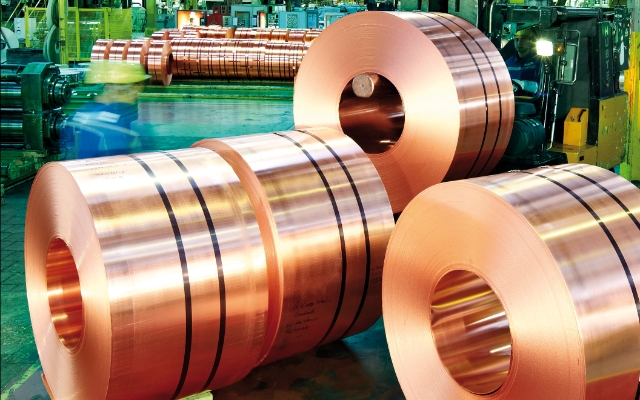Enhancing Your Cooking Area with Costs Copper Products: Tips and Finest Practices
Enhancing Your Cooking Area with Costs Copper Products: Tips and Finest Practices
Blog Article
Discovering the Diverse Applications of Copper Products in Modern Industries
From enhancing the performance of electric systems to playing an important duty in eco-friendly energy innovations, the versatility of copper is obvious. As markets progressively prioritize technology and sustainability, the varied applications of copper necessitate a closer evaluation, particularly concerning their prospective influence on future technological innovations and ecological practices.
Electrical Applications of Copper
Copper is a necessary material in the electrical industry, accounting for about 60% of the total demand for non-ferrous steels internationally - Copper Products. Its exceptional electrical conductivity, which is virtually twice that of light weight aluminum, makes it the preferred option for a wide array of electric applications. From electrical wiring systems in business and residential structures to high-voltage power transmission lines, copper guarantees effectiveness and reliability in electrical energy shipment
In addition to circuitry, copper is integral to the production of electric parts such as motors, transformers, and generators. These parts leverage copper's thermal conductivity and malleability, crucial for warm dissipation and reliable performance. Moreover, copper's resistance to corrosion boosts the life-span and durability of electrical systems, making it a cost-effective service in the long term.
The development of eco-friendly energy resources, such as solar and wind power, has actually better increased the demand for copper in electrical applications. As markets change towards sustainable energy options, copper's duty ends up being a lot more crucial. In general, the convenience and efficiency attributes of copper strengthen its condition as a keystone product within the electrical market, driving technology and efficiency across different applications.
Pipes and Piping Solutions
In modern plumbing systems, the option of materials significantly influences both functionality and longevity. Copper has actually arised as a favored option because of its one-of-a-kind buildings, consisting of corrosion resistance and antimicrobial features. These qualities ensure that copper piping stays long lasting and safe for transferring potable water, an important factor to consider in household and business applications.
One of the key advantages of copper in pipes is its capability to hold up against heats and stress, making it ideal for a selection of applications, from warm water systems to heating and cooling networks. Additionally, copper's versatility permits much easier installation in intricate piping formats, decreasing the threat of leaks and failures.
One more noteworthy benefit is copper's lengthy lifespan, commonly exceeding half a century with correct maintenance. This long life not only reduces replacement costs yet also adds to sustainable methods by lowering waste. Copper's recyclability straightens with modern-day ecological criteria, advertising a circular economic climate within the plumbing industry.
Copper in Renewable Power
The convenience of copper expands beyond pipes applications, playing a crucial function in the renewable power sector. In solar panels, copper is used in photovoltaic cells and electrical wiring, helping with efficient power conversion and transmission.

Moreover, as the international demand for electrical automobiles (EVs) rises, copper's function in battery systems and billing infrastructure comes to be much more considerable. The product's capacity to conduct electricity successfully is indispensable to the efficiency of EV batteries, this article boosting range and billing speed.
Copper's Role in Electronic devices
Electronic devices manufacturing depends heavily on copper's outstanding buildings, especially its high electrical conductivity and thermal effectiveness. These qualities make copper an excellent option for a vast array of electronic parts, including adapters, circuit card, and electrical wiring. The metal's capacity to successfully send electric signals guarantees very little energy loss, which is vital in high-performance electronic tools.
In addition, copper's thermal conductivity plays a substantial function in warm dissipation, shielding delicate components from overheating. This is particularly crucial in modern electronic devices, where compact designs cause enhanced warm generation. Copper is also preferred for its pliability and ductility, allowing it to be conveniently formed into intricate layouts that fulfill the demands of advanced electronic applications.
With the increase of consumer electronics, telecoms, and electrical automobiles, the need for copper in the electronic devices field proceeds to grow. Hence, copper continues to be a foundation material in the ever-expanding field of electronics.
Innovative Utilizes in Production

One significant application remains in additive manufacturing, where copper-based materials are used in 3D printing procedures. This enables the production of intricate geometries and lightweight parts, particularly in the aerospace and automobile industries. In addition, copper's thermal conductivity makes it an ideal option for warmth exchangers, improving effectiveness in industrial cooling systems.
Moreover, the rise of clever manufacturing has seen the incorporation of copper in IoT devices, where its conductive capabilities sustain advanced picking up innovations. In the realm of renewable resource, copper is crucial in the production of photovoltaic panels and wind generators, helping with extra effective power conversion and circulation.
As markets make every effort for sustainability and development, copper's flexibility and performance proceed to place it as a vital material, driving improvements in manufacturing and adding to the advancement of smarter, a lot more efficient products.
Verdict
The important role of copper in eco-friendly power and its crucial feature in electronic devices emphasize its importance in progressing sustainable methods. Collectively, these applications show copper's vital contribution to technological progress and industrial efficiency in modern society.
From boosting the performance of electric systems to playing an important function in sustainable power modern technologies, the flexibility of copper is obvious. As sectors progressively prioritize development and sustainability, the diverse applications of copper require a closer evaluation, imp source especially concerning their potential influence on future environmental practices and technical developments.
The development of renewable power resources, her explanation such as solar and wind power, has actually further enhanced the need for copper in electric applications. In general, the flexibility and performance features of copper solidify its status as a cornerstone product within the electrical sector, driving advancement and performance throughout various applications.
The versatility of copper expands beyond plumbing applications, playing a vital function in the eco-friendly energy market.
Report this page